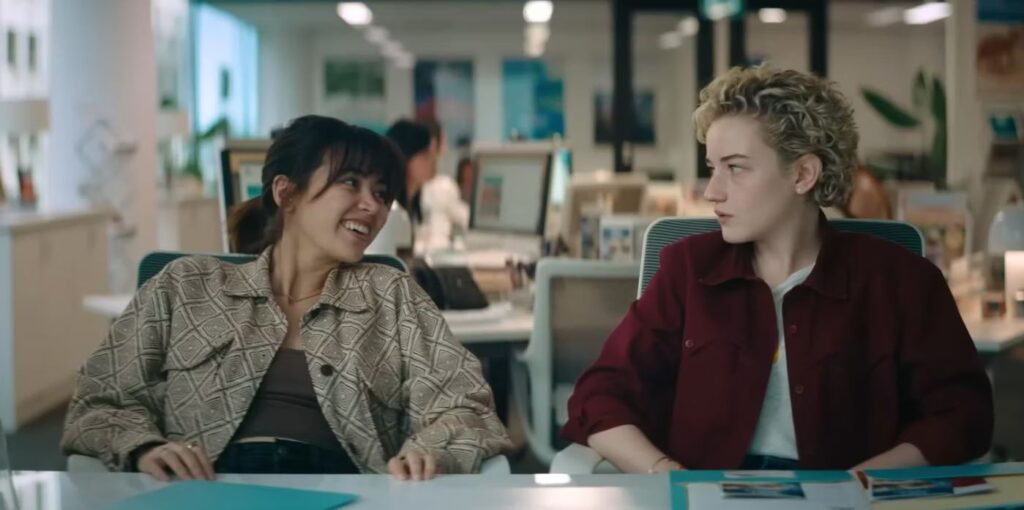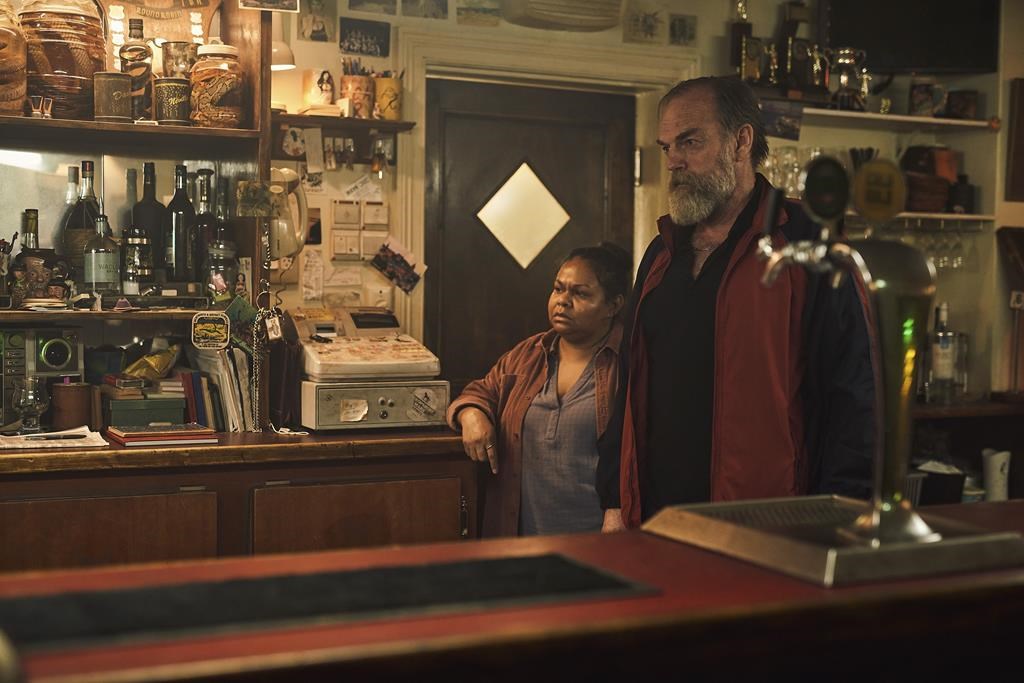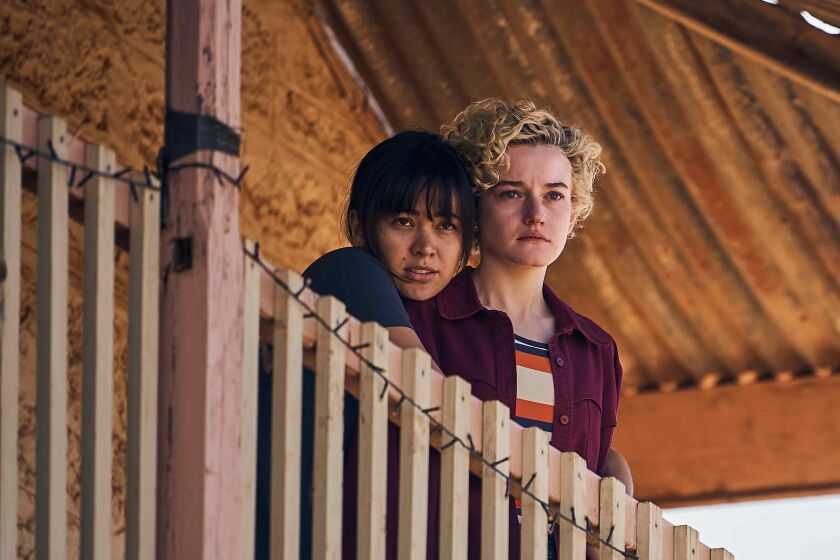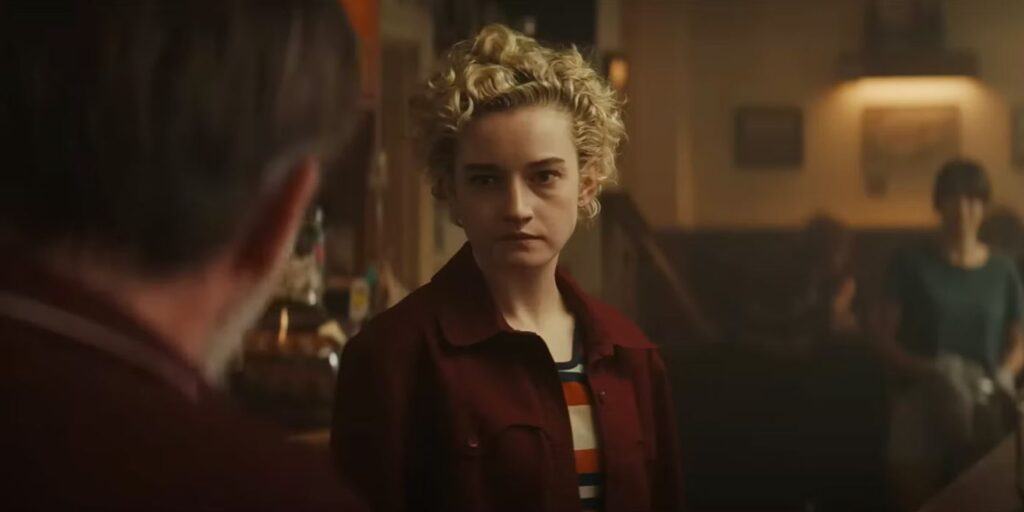
Finalizing the paperwork, the interviewer asks a throwaway, borderline-rhetorical question: “Are you OK with receiving a little male attention?” The two young women sitting across from her exchange a smirk. “I think we can handle that,” one of them responds with a twinkle in her eye. The forms are stamped, the directions are provided, and without ceremony our heroines accept their offer of temporary employment—a comfy gig that gradually turns into a fraught, transformative odyssey.
This is the innocuous, loaded opening of Kitty Green’s The Royal Hotel, and while the movie’s gradual shift from road-trip hangout to claustrophobic reckoning is dramatic, it doesn’t necessarily come as a surprise—not if you’ve seen Green’s first feature, The Assistant. That film transpired over a single dreary day in the Manhattan office of a Hollywood studio, where an ambitious gofer busied about her dull and dispiriting work in an atmosphere thick with complicity and abuse. Aside from a single tête-à-tête with an HR manager, nothing really happened in The Assistant, but Green nonetheless turned her protagonist’s sober, shameful routine into a trenchant commentary on feminine helplessness and male power. Comparatively speaking, The Royal Hotel represents a significant logistical expansion; it spans two weeks rather than 24 hours, it visits multiple locations, and it features a number of incidents which, when tied together, resemble something akin to a plot. But the two pictures share a fully formed sensibility—a yin-yang anxiety of impotence and rage.

Our two female friends are Hanna (Julia Garner, reteaming with Green after starring in The Assistant) and Liv (Jessica Henwick, ascending following supporting roles in The Matrix Resurrections and Glass Onion). They’re backpacking through Australia on vacation from Canada, or at least that’s what they tell inquiring minds; it’s unclear whether they’re actually Canadian or if they’re just using that label as cover to camouflage a darker past. Regardless, when we first see them striding through the crowd of a maritime nightclub, they’re comfortable and confident—Hanna hungrily pursues a Norwegian beefcake (Herbert Nordrum), while Liv catches the bartender’s eye when she orders a Foster’s—but they soon realize they’re out of cash. Determined if not excited, they arrange to join a “work-study” program, meaning they’ll take short-term jobs as live-in bartenders at the titular establishment, a hole in the wall that puts the “out” in Outback.
If the term “royal hotel” conjures images of dignity and refinement, the actual bar proves to be a dilapidated shithole, with peeling paint, unreliable plumbing, and a distinct lack of Wi-Fi. But while it may lack curb appeal, it still draws plenty of business from local miners; Hanna and Liv’s first night shift, during which one of their predecessors gets hammered and dances wildly on the counter amid a throng of handsy enthusiasts, makes the place seem like the down-under version of Coyote Ugly. The challenge our heroes must face is not so much to learn the tricks of the trade—the movie is leagues removed from Tom Cruise’s drink-mixing exploits in Cocktail—but to acclimate themselves to this environment of lechery and bravado.

Which is both obvious and complex. The men who frequent the Royal Hotel are not exactly all the same; instead, they occupy different points along a continuous spectrum of brutishness. There is Matty (Toby Wallace), the bright-eyed youth whose playfulness—watch as he dupes Liv into speaking the phrase, “Dicken Cider”—masks a more aggressive persistence. There is Teeth (James Frecheville), a strong-backed grunt with a hair-trigger temper. There is Dolly (Daniel Henshall), a seemingly mild-mannered bloke who’s nevertheless accustomed to getting his way. And there is Billy (a reliably disheveled Hugo Weaving), the no-nonsense proprietor who instantly sizes up Hanna’s plucky intelligence and dubs her “smart cunt.”
“What did he just call me?” Hanna says to Liv in disbelief. Over time, as she learns to navigate the bar’s social topography, her shock will be replaced by recognition, weariness, and anger. (The moment when she learns the crude nickname that patrons have given her is especially crushing.) Green, through a combination of masterful patience and delicate detail, cultivates a cloistered world where her two women perpetually find themselves to be objects of male power. This is not strictly a matter of lust—Matty plainly has the hots for Hanna and slowly attempts to seduce her with the help of a nearby waterfall (plus Kylie Minogue), while Teeth makes feeble advances toward Liv only to be mocked by his comrades—but also one of control. Bartenders are by nature creatures of service, and the customers here brandish their dollar bills as instruments of acquisition—not just to buy beer, but to purchase obedience. If these rugged men are going to give these docile women their hard-earned money, well, the least the chicks could do is smile more.

The concept of women being the target of male taunts and micro-aggressions is nothing new; Green’s great gift lies in her ability to imbue such harassment with palpable menace. It seems dubious to label The Royal Hotel a thriller given its unassuming style—Green’s shooting method is intimate and observant, if not passive—but the movie nevertheless develops a miasma of incipient violence. In empirical terms, there is minimal action, but the longer Hanna and Liv remain behind the bar and parry their clientele’s verbal attacks, the more they seem to be in physical danger. A scene in which Dolly chats with a visiting couple while insisting on another drink seethes with tension, while the moment when Hanna scans for feet under her doorframe impossibly recalls a sequence from No Country for Old Men. Green, wielding sharp dialogue and freighted silences (she wrote the screenplay with Oscar Redding, adapting a 2016 documentary), turns pockets of inactivity into cauldrons of suspense.
The fine-grained detail of The Royal Hotel—the baking sun, the arid landscape, the inimitable inflections of “g’day” and “mate”—has the paradoxical effect of circumscribing the picture’s intensity. The brilliance of The Assistant, whose pointedly anonymous office building could have been housed anywhere, was its absence of incident; it felt like anything could happen precisely because nothing ever did. The Royal Hotel is more conventional: It burns slowly, gradually accumulates momentum, and inexorably hurtles toward a cathartic climax. This is satisfying but also somewhat limiting, crimping the movie’s allegorical impact and rooting its ideas in its particular setting and characters.

Which, in fairness, is hardly a bad thing. The rigorous specificity of The Royal Hotel shouldn’t be a mark against it, and its lead performances only clarify its personal and dramatic stakes. Hanna and Liv may be fast friends, but they’re people rather than ciphers, and the actors quietly underline the characters’ differing temperaments while also fortifying their solidarity. Liz is energetic and brash to the point of recklessness, and Henwick demonstrates how sex-positivity can be both liberating and jeopardizing. For her part, Hanna is more cautious—a sensible instinct that also makes her ripe for accusations of prudishness—and Garner once again conveys an exquisite blend of timidity and ferocity, revealing the wariness that lurks behind her flashing eyes. She’s watchably watchful.
That Liv and Hanna must straddle impossible lines—deflecting male attention (remember that phrase?) without causing offense, lowering their guard without becoming vulnerable, serving without suggesting—is what animates Green’s frustration, and what lends The Royal Hotel its thematic force. She has constructed (or better yet, acknowledged) another ecosystem in which casual abuse is not the product of isolated behavior but an inviolate demographic fact. Yet she has also, for the first time, allowed a sliver of hope to infiltrate her dark vision of society—a gesture less of sentimentality than of defiance. Perhaps it’s a fantasy, but her heroines have had enough. The patriarchy is facing its last call.
Grade: B+
Jeremy Beck is the editor-in-chief of MovieManifesto. He watches more movies and television than he probably should.
